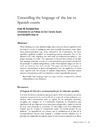Identificador persistente para citar o vincular este elemento:
https://accedacris.ulpgc.es/jspui/handle/10553/58798
| Campo DC | Valor | idioma |
|---|---|---|
| dc.contributor.author | González Ruiz, Víctor M. | en_US |
| dc.date.accessioned | 2019-12-16T20:09:33Z | - |
| dc.date.available | 2019-12-16T20:09:33Z | - |
| dc.date.issued | 2009 | en_US |
| dc.identifier.issn | 1139-7241 | en_US |
| dc.identifier.other | Dialnet | |
| dc.identifier.uri | https://accedacris.ulpgc.es/handle/10553/58798 | - |
| dc.description.abstract | When deciding on a case, Spanish judges must construe relevant legislation with the help of a body of ambiguous and often mutually inconsistent rules. Apart from general principles (e.g. those collected in the Constitution), the most significant guideline available for interpreting statutes, subsection 3(1) of the Spanish Civil Code, stipulates that rules shall be interpreted according to “the proper meaning of words”. The vagueness of this provision, based on the idea that language conforms to reality in a univocal manner, goes hand in hand with the principle of judicial independence, under which Spanish judges are free to make any decisions they think suitable. This paper describes the principles of statutory interpretation in Spain and emphasizes how the application of these rules, together with the concept of judicial independence, sometimes makes statutory interpretation and court decisions a rather unpredictable process. | en_US |
| dc.description.abstract | A la hora de dictar la resolución que pone punto final a un proceso, los jueces españoles interpretan la ley con la ayuda de un corpus de normas ambiguas y, en muchos casos, incoherentes entre sí. Aparte de los principios generales, recogidos por ejemplo en la Constitución Española, la herramienta más significativa de que disponen estos jueces para comprender y aplicar la letra de las leyes está contenida en el artículo 3.1 del Código Civil. Esta disposición estipula que las normas se interpretarán según “el sentido propio de sus palabras”. La vaguedad de este criterio, que se fundamenta en la idea de la correspondencia unívoca entre lenguaje y realidad, coexiste, además, con el principio de independencia judicial, según el cual los jueces españoles son libresde tomar las decisiones que consideren adecuadas. Este artículo describe los principios de interpretación legal vigentes en España, con el objeto de subrayar cómo la aplicación de estos criterios, unida al principio de independencia judicial, convierten la exégesis legislativa y las resoluciones judiciales, en ocasiones, en procesos de resultados imprevisibles. | en_US |
| dc.language | eng | en_US |
| dc.relation.ispartof | Iberica | en_US |
| dc.source | Ibérica: Revista de la Asociación Europea de Lenguas para Fines Específicos ( AELFE ) [ISSN 1139-7241] (18), p. 93-108 | en_US |
| dc.subject | 57 Lingüística | en_US |
| dc.subject.other | Lenguaje legal | en_US |
| dc.subject.other | Género legal | en_US |
| dc.subject.other | Interpretación legal | en_US |
| dc.subject.other | Independencia judicial | en_US |
| dc.subject.other | Resoluciones judiciales | en_US |
| dc.subject.other | Legal language | en_US |
| dc.subject.other | Legal text type | en_US |
| dc.subject.other | Statutory interpretation | en_US |
| dc.subject.other | Judicial independence | en_US |
| dc.subject.other | Court decisions | en_US |
| dc.title | Unravelling the language of the law in Spanish courts | en_US |
| dc.type | info:eu-repo/semantics/Article | en_US |
| dc.type | Article | en_US |
| dc.identifier.scopus | 77950765901 | |
| dc.identifier.isi | 000270615200006 | |
| dc.identifier.url | http://dialnet.unirioja.es/servlet/articulo?codigo=3185244 | - |
| dc.contributor.authorscopusid | 57195195300 | |
| dc.description.lastpage | 108 | - |
| dc.identifier.issue | 18 | - |
| dc.description.firstpage | 93 | - |
| dc.investigacion | Artes y Humanidades | en_US |
| dc.type2 | Artículo | en_US |
| dc.contributor.daisngid | 679108 | |
| dc.contributor.authordialnetid | 1068113 | - |
| dc.identifier.dialnet | 3185244ARTREV | - |
| dc.contributor.wosstandard | WOS:Ruiz, VMG | |
| dc.date.coverdate | Septiembre 2009 | |
| dc.identifier.ulpgc | Sí | es |
| dc.description.sellofecyt | Sello FECYT | |
| dc.description.ahci | AHCI | |
| dc.description.ssci | SSCI | |
| dc.description.erihplus | ERIH PLUS | |
| item.fulltext | Con texto completo | - |
| item.grantfulltext | open | - |
| crisitem.author.dept | GIR IDETIC: División de Traducción e Interpretación y Aprendizaje de Lenguas | - |
| crisitem.author.dept | IU para el Desarrollo Tecnológico y la Innovación en Comunicaciones (IDeTIC) | - |
| crisitem.author.dept | Departamento de Filología Moderna, Traducción e Interpretación | - |
| crisitem.author.orcid | 0000-0001-7193-0406 | - |
| crisitem.author.parentorg | IU para el Desarrollo Tecnológico y la Innovación en Comunicaciones (IDeTIC) | - |
| crisitem.author.fullName | González Ruiz, Víctor Manuel | - |
| Colección: | Artículos | |
Visitas
188
actualizado el 15-ene-2026
Descargas
46
actualizado el 15-ene-2026
Google ScholarTM
Verifica
Comparte
Exporta metadatos
Los elementos en ULPGC accedaCRIS están protegidos por derechos de autor con todos los derechos reservados, a menos que se indique lo contrario.
